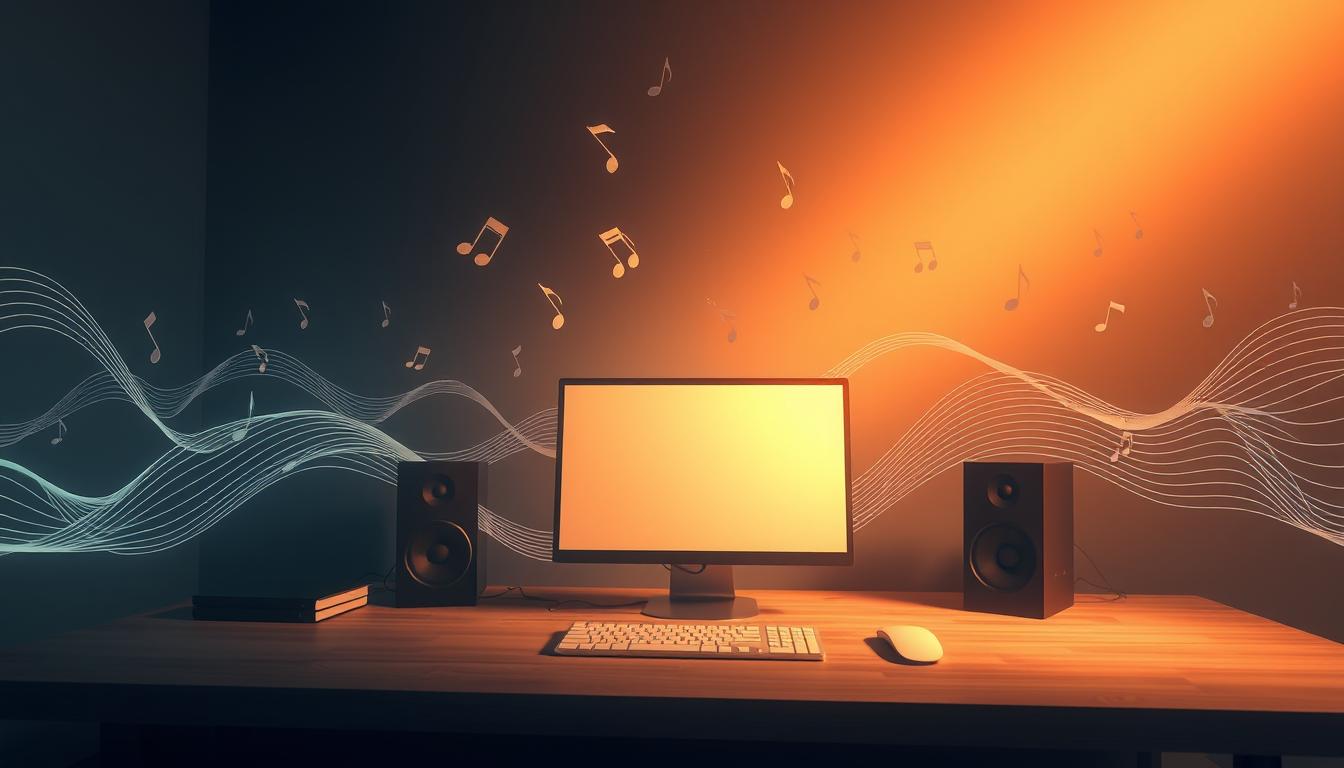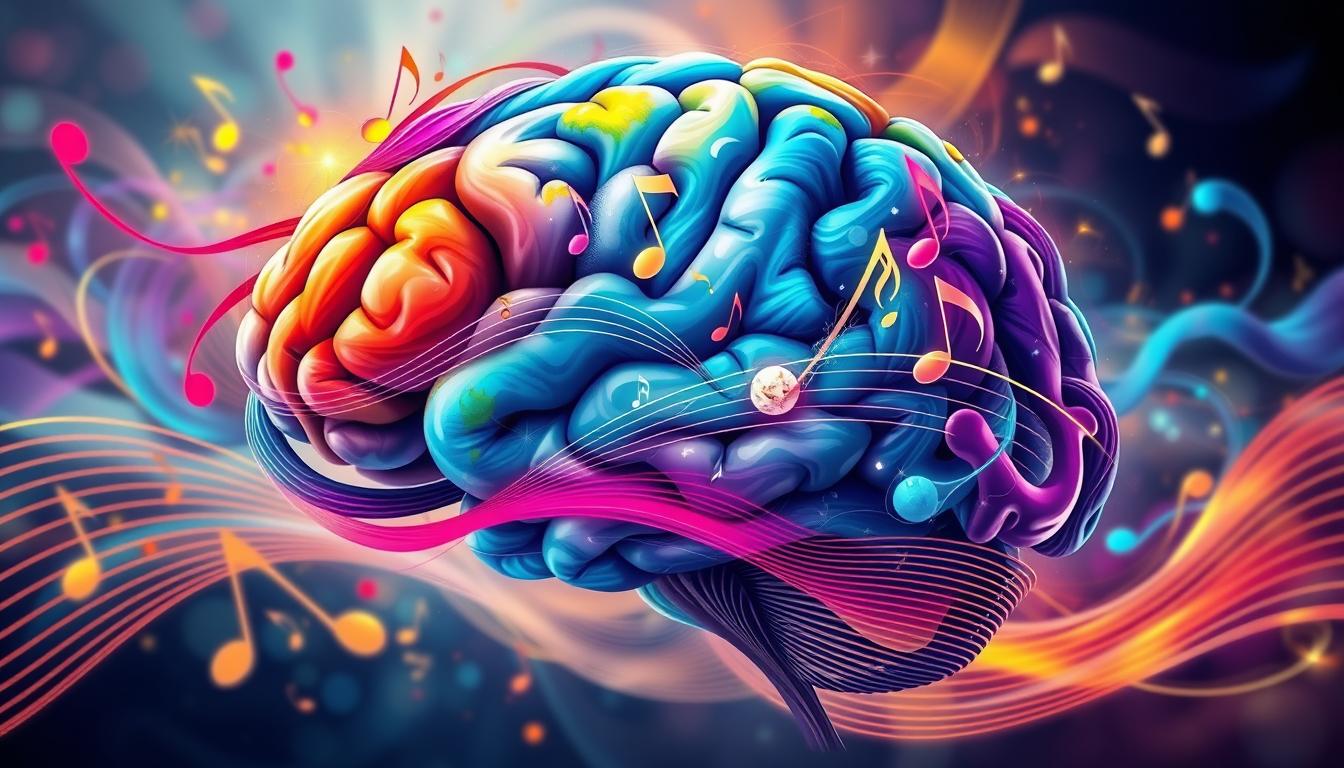Last Updated on December 9, 2025
Exploring the link between music and productivity can greatly boost your concentration. Studies reveal that the correct music can sharpen focus, aiding those with attention issues. Whether you’re deep in study or working with background tunes, various genres hold unique advantages. This section delves into how personal taste affects the impact of different musical styles on productivity.
Key Takeaways
- Listening to classical music, particularly works by Mozart, enhances spatial-temporal reasoning.
- A medium level of ambient noise can boost creativity during work or study.
- Many individuals find that slower beats in ambient music improve their study sessions.
- High-tempo music can make physical exercises feel easier and boost performance.
- Nature sounds, such as flowing streams, improve mood and increase productivity.
Understanding the Connection Between Music and Focus
Music significantly impacts your ability to focus, acting as a potent tool to boost productivity. Research shows that specific music types, especially background music for work, can reduce distracting sounds. This allows you to concentrate better. Music for focus productivity not only makes the environment more enjoyable but also improves memory and attention, as the National Library of Medicine confirms.
Studies by the Harvard Business Review reveal that listening to music you enjoy enhances performance. The right music activates the brain’s reward centers, especially during new music experiences. This boosts both mood and motivation, essential for sustained concentration. Moreover, music with a consistent beat is more effective for productivity than music with changing tempos.
Concentrating on lyrics can be distracting. Instead, instrumental or ambient music is less intrusive, aiding better focus. Listening to music without lyrics, especially for tasks requiring deep mental effort, offers a significant advantage. Natural sounds and specific ambient noise levels can also create a calming effect, enhancing focus and satisfaction at work.

Integrating these elements into your work routine can improve productivity. Taking music breaks between tasks can increase academic performance and extend focus during difficult assignments. Exploring different genres, like classical or electronic, can unlock new engagement levels in your work. Finding what resonates with you is key to reaching your full potential.
The Role of Executive Attention in Focused Work
Executive attention is vital for maintaining focus at work. It allows you to filter distractions and stay focused. Music designed for focus, like that from Brain.fm and Focus@Will, can boost concentration by up to 400%. They use sound science to enhance your attention.
Studies show that background music, especially classical, jazz, and ambient, boosts productivity and focus. The right music can align your brainwaves, improving focus. This state of focus enhances your project engagement.
Spotify and Apple Music offer “focus” playlists to suit different tastes. These playlists aim to improve concentration. Whether you like instrumental or specific genres, music can make your work environment more productive.
Music for Focus Productivity: Why Genre Matters
The genre of music you choose significantly impacts your focus productivity. Different styles can influence your concentration levels. Your personal preferences also play a crucial role in determining the effectiveness of music in your work environment. Exploring why genre matters involves understanding your tastes and how various music affects your cognitive processes.
Individual Preferences in Music Selection
Your musical preferences greatly influence your concentration while working. Listening to music you enjoy can boost your mood and creativity. Genres like classical, jazz, and cinematic scores are favored for their ability to evoke emotions without causing distraction. Here are some key points to consider:
- Personalized playlists can enhance your engagement during tasks.
- Familiar genres may help your brain enter a productive state more easily.
- Experimenting with different types of music can lead to discovering what best fuels your focus productivity.
Impact of Familiar Music on Concentration
Familiar music profoundly affects your concentration. Research shows that well-loved songs activate brain regions linked to movement and emotion, improving focus through emotional engagement. Listening to familiar tracks while working creates a sense of comfort, reducing distractions. Consider this:
Listening to your favorite music can breathe life into mundane tasks, making them feel more inspiring and important.
Incorporating familiar music into your workflow can increase productivity and creativity. Platforms like Spotify and YouTube offer curated playlists for various work styles. This allows you to find the perfect music for your projects.

Effect of Slow and Fast Music on Concentration
Music’s tempo significantly impacts your concentration. Studies reveal that slow and fast music have different effects on focus. Choosing the right music can greatly enhance your ability to concentrate and stay productive.
Soft-Fast vs. Loud-Fast Music
The difference between soft-fast and loud-fast music is crucial for concentration. Soft-fast music creates a soothing atmosphere that boosts learning mildly. On the other hand, loud-fast music can be distracting rather than helpful for focus.
- Soft-fast music helps maintain steady concentration.
- Loud-fast music can elevate arousal, causing distraction.
- Softer tempos lead to better task performance and less mind-wandering.
Instrumental Music vs. Music with Lyrics
When choosing concentration music, consider whether to pick instrumental or lyric-based tracks. Instrumental music provides a non-intrusive background for better focus. Music with lyrics, however, can split your attention, making concentration harder.
- Instrumental music supports sustained attention without verbal distractions.
- Music with lyrics often divides your focus between the task and the words being sung.
- Selecting instrumental tracks can enhance cognitive tasks, particularly linguistic processing.

The Science Behind Music and Brain Function
The bond between music and brain function goes beyond simple enjoyment. Ongoing research reveals the deep effects of various music types on our cognitive skills, especially in stress relief and focus. Grasping this connection helps you use music more effectively in your daily routine.
How Music Affects Stress and Attention
Music can reduce stress by altering our body’s responses. Studies show that familiar tunes can lower cortisol, boosting focus. This stress reduction aids in better concentration and creates a productive environment. Your music preferences play a significant role, as different genres elicit unique emotional and cognitive reactions, influencing focus differently.
The Mechanism of Entrainment in Music
The concept of entrainment shows how rhythmic music aligns with brainwaves, enhancing focus. This alignment improves efficiency, especially in creative tasks. The right tempo can stimulate your thinking, improving cognitive function. Research indicates that music around 112 BPM is best for study playlists, matching human attention spans that have decreased.

Classical Music: The Mozart Effect and Beyond
Classical music has long fascinated researchers, especially the Mozart effect. This phenomenon suggests that listening to specific compositions, especially those by Wolfgang Amadeus Mozart, can enhance cognitive abilities. Specifically, it improves spatial-temporal reasoning. Studies have shown that subjects listening to Mozart’s *Sonata for Two Pianos in D Major (K448)* for just 10 minutes demonstrated a significant improvement in their spatial IQ. Their scores elevated by as much as 8 to 9 points compared to other conditions.
While some research has struggled to replicate these findings, a trend does exist. Many have confirmed that listening to classical music, particularly from masters like Mozart, can lead to a temporary boost in performance. For instance, even laboratory rats in one study completed maze tests faster while exposed to Mozart’s works than to silence or different types of music.
Furthermore, engaging preschoolers in keyboard lessons for six months significantly improved their spatial-temporal reasoning. Those children outperformed their peers who received no musical training or participated in computer lessons by over 30%. This correlation highlights the power of early exposure to productivity music and its potential long-term benefits.
The mechanisms behind the Mozart effect extend beyond cognitive performance. Listening to Mozart’s pieces has been shown to enhance brain activity, particularly in regions responsible for mental imaging and emotional processing. Remarkably, even in clinical settings, listening to this classical music has demonstrated benefits. For example, it has been shown to reduce epileptiform activity among patients experiencing seizures.
In summary, the enduring popularity of classical music serves as a vital tool for enhancing brain performance. With its proven ability to elevate cognitive skills and nurture creativity, the embrace of the Mozart effect might just be a key ingredient for those looking to improve focus and productivity.

Ambient Music for Deep Work
Ambient music is now a favorite for deep work enthusiasts. Its calming soundscapes promote focus without overwhelming the senses. For complex tasks or creative endeavors, focus music like ambient tracks offers an excellent background. It helps to filter out distractions.

Popular Ambient Music Playlists
Streaming platforms like Spotify and YouTube have curated ambient music playlists for productivity. These playlists include:
- Lo-fi beats, known for steady rhythms and minimal lyrics.
- Nature sounds that act as background noise, boosting focus.
- Instrumental tracks that foster deep concentration, free from vocal melodies.
Many find playlists on the Chillhop Music YouTube channel particularly effective. These collections create a soothing atmosphere. They meet the needs of those doing repetitive tasks or critical thinking.
Exploring different playlists can boost your productivity. As you delve into various ambient music options, consider adjusting volume levels or using headphones. This helps maintain focus in shared spaces while you’re fully engaged in your work.
The Coffee Shop Effect: Background Noise for Creativity
The “coffee shop effect” shows how moderate background noise boosts creativity and focus. Studies found that sounds between 50 to 70 decibels, like soft music or conversations, greatly improve thinking. People in these studies finished tasks faster and came up with more innovative ideas when surrounded by coffee shop ambiance.
Research also shows that background noise optimizes brain processing. This noise stimulates the senses, sparking creativity. The presence of others adds to this effect, making people feel more driven, even in a casual setting like a coffee shop.
Though the perfect level of background noise varies, many appreciate mimicking this environment at home. Websites and apps offer simulated coffee shop sounds, like clinking cups and distant chatter, for your home office.
With more people working remotely, the charm of coffee shops has grown. In Britain, about 70% of workers visit a coffee shop at least once a week. They use the lively atmosphere to boost their productivity.
Upbeat Music and its Influence on Productivity
Engaging with upbeat music can significantly boost your productivity. High-tempo music’s energetic qualities invigorate listeners, creating an ideal atmosphere for efficient task completion. Studies show many individuals use productivity music during work, finding it improves focus and motivation.
High-Tempo Music for Increased Energy
High-tempo music, with its fast beats and lively rhythms, increases energy and enthusiasm. This energetic backdrop encourages a more vigorous approach to tasks, especially those requiring physical effort or repetitive actions. Whether it’s a fast-paced pop song or an adrenaline-pumping rock anthem, the right upbeat music fosters an environment where you feel motivated to excel.
Different genres of productivity music have unique effects, making it crucial to choose music that aligns with your work type. For example, some may find classic rock or alternative invigorating, while others prefer pop or dance tracks for an energetic boost. Fast beats in music can trigger dopamine release, enhancing your mood and making tedious tasks more enjoyable. This highlights the importance of selecting high-tempo music to create a stimulating work atmosphere.
Integrating upbeat music into your workday can shift your mindset, promoting joy and elevating productivity. Whether in a bustling office or working from home, the right playlist can influence both your output and enjoyment of the workload.
Exploring Nature Sounds for Enhanced Focus
Nature sounds are a great alternative for boosting concentration during work or study. Sounds like birds chirping or flowing water create a focus-enhancing environment. They also promote a calming atmosphere.
Studies show that nature sounds can lower stress levels. This calming effect is beneficial in work settings where distractions can reduce productivity. Soft background sounds help maintain focus without overwhelming your thoughts.
Listening to productivity music with nature sounds can enhance focus. This auditory environment supports tasks that require deep concentration. Incorporating these sounds into your routine can improve your output and mood.
- Birdsong can enhance cognitive performance.
- Flowing water sounds increase relaxation and focus.
- Nature sounds can create a pleasing backdrop, making tedious tasks more enjoyable.
Finding the right volume and sound type is crucial. Some prefer gentle rain or ocean waves, while others like crickets at night. Exploring different nature sounds helps find the best for enhanced focus.

Utilizing Noise Colors: Pink and White Noise
Integrating pink noise and white noise into your daily routine can transform how you approach focus music. Studies reveal that these noises can reduce distractions, creating an environment that supports concentration. Pink noise, with its balanced sound spectrum, boosts memory and attention. It outperformed quiet conditions in focus tasks, according to research.
White noise, meanwhile, blocks out disruptive sounds, keeping your focus sharp. It’s especially helpful in noisy settings. In medical fields, white noise has been used to treat tinnitus and insomnia, showcasing its wide-ranging benefits.

If you aim to boost productivity, try incorporating pink or white noise into your routine. Experimenting with these frequencies could lead to a more focused and peaceful mental state.
Conclusion
Using music can greatly boost your focus and work efficiency. By picking music that you enjoy, you can make a better work environment. Studies show that the right music can improve your thinking, reduce stress, and help you stay focused.
Exploring different music genres, from classical to ambient, can help you find what works best for you. Not all music is good for work; some might help with simple tasks but not complex ones. So, trying out different sounds and playlists is key to finding the perfect music for your work.
Getting the right mix of sound can lead to better concentration and productivity. Think about adding white noise or your favorite relaxing music to your work sessions. By understanding how music affects you, you can create a space where you can focus and be productive.








